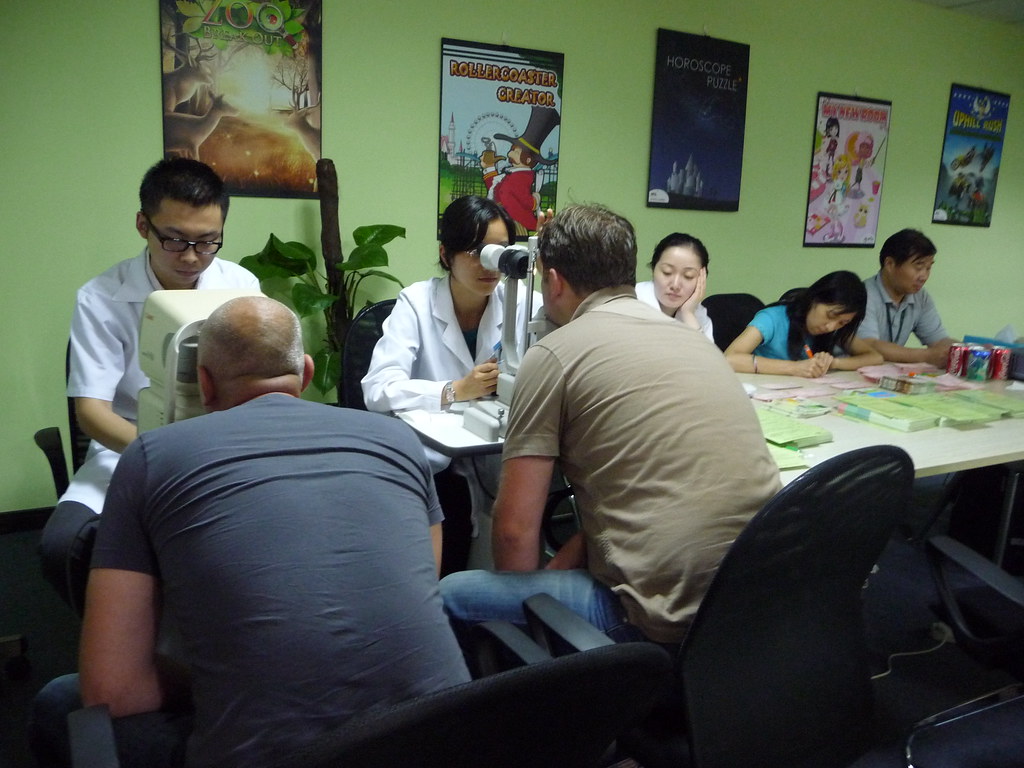 Every year all Spil Games Asia and Zlong Games employees get a free health check. One part of that is an eye test, which is performed in our company. Because we had some visitors from Spil Games in Holland, they also could do the eye check (both passed, but one unintentionally tried to cheat because he was wearing contacts – which the doctors found out about right away of course :-).
Every year all Spil Games Asia and Zlong Games employees get a free health check. One part of that is an eye test, which is performed in our company. Because we had some visitors from Spil Games in Holland, they also could do the eye check (both passed, but one unintentionally tried to cheat because he was wearing contacts – which the doctors found out about right away of course :-).
Interesting is that when I left Daimler in 2002 I needed to wear glasses while driving or while watching a movie. Nowadays I don’t need my glasses anymore, and today’s eye test confirmed that my eyes only have a slight deviation from optimal. Kind of strange isn’t it? Could it be because my computer screen at Daimler was not good enough and that when I stopped working and went back to university my eyes recovered? I cannot explain it, but maybe one of my readers can?
Hi Marc,
Okay, so I'm going to take a stab at this one, and please note that I'm hardly an expert here, just a fellow eye sufferer…
Corneal thickness in any given eyeball ranges from an average 500 microns thickness to in some severely afflicted cases of less than 200 microns. In the latter case, serious vigilance is required and regular checkups/interventions with an ophthalmologist must be done in order to ensure such a cornea doesn't get infected (which can permanently impair your vision), which is likely for a cornea this thin. Imagine a sail flapping in the wind at the slightest incidence of a breeze and how this can wreak havoc on light refraction which hits the back of your eye, your retina.
Indeed, corneal shape and thickness changes drastically as we age…and in the case of over 50s (and you're nowhere near that!) there is the natural advent of presbyopia, which is the cause for why older people require reading glasses, generally.
The more often you wear prescribed correction (egs. specs, contact lenses, whatever), the weaker your eye muscles undoubtedly become, and the more they depend upon such crutches of correction in order to hammer letters off the Snellen chart or to simply gander down a street for far-away distances.
I'm going to take a wild unpolitically correct stab here as well to say that Chinese people, in the main, have a hereditary disposition towards myopia, or nearsightedness (do a straw poll on any major Mainland China street across all age groups, and it's readily apparent), but there might also be something in connection with their cities, chock-a-block as they are. Urban Chinese eyes hardly ever have a chance to be at rest, and this is part of the persistent strain such eyes are constantly under.
In your case with your computer, and given when you were still at Daimler, the internet was still likely in its relative infancy and you weren't going completely paperless. As such, your eyes were under unceasing strain, and so you couldn't back off to plainly "listen" to a report form one of your subordinates or to enjoy an educational podcast or something similar in order to intake information. You always had to read, read, read, alas…
When you stopped overloading your eyes' visual fields, they gradually began to relax. You started to use your glasses less and less, and your eyes likely experienced a strengthening. That's what accounts for your growing freedom from wearing your former constant seeing companions, or as I used to like to call them, "my eyes"…
As you'll be aging, however, recall earlier what I'd written about the changing corneal topographies and the fact that your corneas might be stretching…as they stretch, they will alter your entire visual acuity and depth of field, and if you've once had spectacles there might come a time when you may unfortunately have to revert to them. Think of your vision as something akin to a bell curve…hardly any correction as a child, more towards your 20s and 30s, and perhaps less in your later years, other than for reading.
It's my wish that you never have to return to specs…but just in case, this is one possible cause.
Also, in university you likely lead a more active lifestyle, and it's a proven medical fact that exercise is good at stimulating blood flow, which is good for overall eye health.
Phew…
Sorry for being so long-winded about this!
I relished your videocast with Christine Lu, enjoy your musings on the local business culture, and the piece de la resistance was your remark about how "…not to listen to the cock and bull story the mass media likes to cook up about China. Just come here and see thing for yourself." Full disclosure: okay, so you didn't utter it precisely in that way, but the gist is contained therein. 😉
I've now subscribed to your feed, and look forward to your future musings and thoughts. Nice punchy format, ps!
From Prague, Czech Republic,
Adam Daniel Mezei
adamdanielmezei@gmail.com
Thanks a lot for this detailed comment Adam. This indeed proves my theory, hope my eyes will stay OK for a long time!